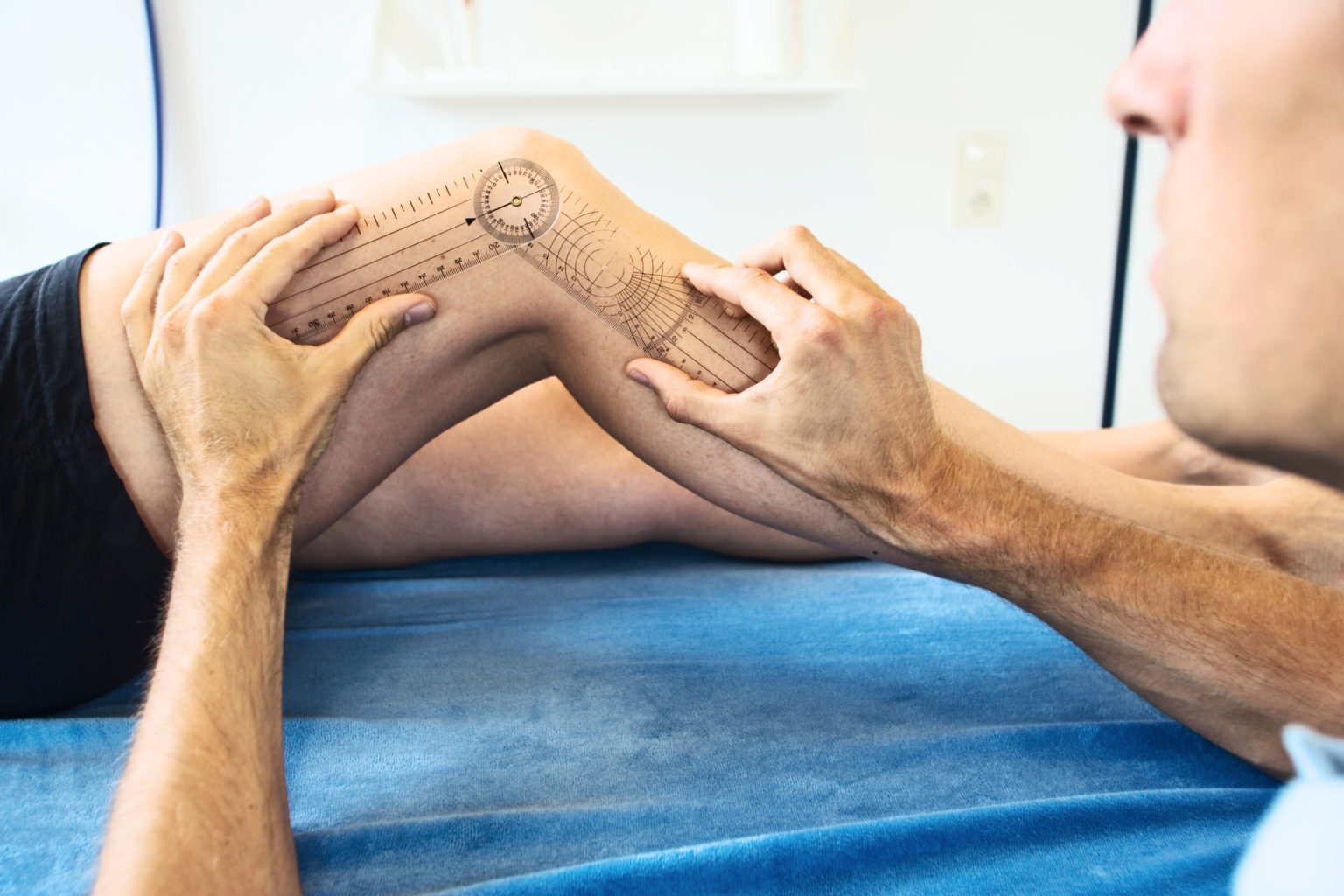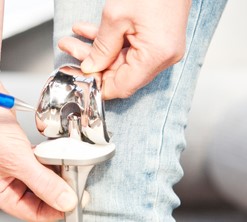
![]() By John R. Mishock, PT, DPT, DC
By John R. Mishock, PT, DPT, DC
Total knee arthroplasty (TKA) has become the third most common inpatient surgery in the United States, with 750,000 yearly procedures projected to double in the next decade. (Sloan et al. 2018) There has been a marked increase in the utilization of TKA, estimated to be 600% by 2030. This increase is due to obesity, an aging population, a broader range of approvable indications, significant surgical advancements, and an increased number of procedures performed in younger populations (Losina E et al., 2012). When the knee cartilage (meniscus) wears out and degenerates (osteoarthritis), it can lead to unremitting pain, swelling, muscle weakness, and decreased mobility leading to substantial difficulty in carrying out even basic physical functions. These worsening physical impairments will slow the recovery following surgery, making post-surgical physical therapy more difficult.
Total knee arthroplasty (TKA), or total knee replacement, is an effective surgical approach to managing these conditions. TKA can decrease knee pain, improve stiffness and increase knee mobility, ultimately beginning the process of restoring the patient’s quality of life, returning to work, recreation, and sport. However, 18% of patients who undergo TKA are not satisfied with the postoperative outcomes (Anderson et al., 2021). Beyond this, more than 1 in 5 patients do not regain their physical function after TKA. (Wieczorek et al. 2020) Many factors could lead to poor outcomes following surgery.
A scientifically based physical therapy and rehabilitation program is critical to optimizing recovery. However, physical therapy before surgery can significantly improve post-surgical recovery and reduce the cost associated with the TKA procedure. This type of physical therapy is called “prehabilitation” or “pre-hab,” physical therapy and education before having orthopedic surgery.
Pre-hab has been shown to improve knee ROM and functional movements following surgery before beginning post-surgical knee physical therapy and rehabilitation. (Chen et al., 2018) A study from the University of Louisville demonstrated that pre-operative physical therapy for total knee replacements helps speed postoperative recovery by increasing initial levels of strength and function. “Pre-hab” also reduced recovery time and overall healthcare costs. (Swank et al., 2011)
 A joint study from New England Baptist Hospital, Beth Israel Deaconess Medical Center, and Harvard Medical School, demonstrated the benefits of “pre-hab.” They studied knee and hip replacement surgery patients who performed strength training, aerobic conditioning, and flexibility exercises for six weeks before total joint surgery. The regimen reduced the need for inpatient rehabilitation by 73%. (Gibson et al., 2015)
A joint study from New England Baptist Hospital, Beth Israel Deaconess Medical Center, and Harvard Medical School, demonstrated the benefits of “pre-hab.” They studied knee and hip replacement surgery patients who performed strength training, aerobic conditioning, and flexibility exercises for six weeks before total joint surgery. The regimen reduced the need for inpatient rehabilitation by 73%. (Gibson et al., 2015)
Pre-hab for TKA patients has also resulted in a marked decrease in hospital length of stay, with 37.1% of pre-hab physical therapy patients leaving inpatient care on postoperative day 1. The savings were estimated to be $21,173 in that study. Beyond this, “pre-hab” physical therapy patients were 42% more likely to return home than remain in a skilled care facility and less likely to require costly home health care services, representing another significant cost savings. (Garrison et al., 2019)
Physical Therapy is more than just Exercise!
Physical therapists are doctorate-trained health care providers who can make a diagnosis, treat pain, improve function, enhancing the individual’s quality of life. At Mishock Physical Therapy & Associates, the patient would receive the following as part of their physical therapy or “pre-hab” care:
Through Evaluation: The physical therapist would perform a comprehensive history and physical exam. This evaluation would determine the cause of pain and the functional deficits leading to poor quality of life at home, work, or recreation.
Patient education: At Mishock PHYSICAL THERAPY & Associates, we explain how physical impairments lend to poor function. Our physical therapist will educate the patient on the cause of pain or movement dysfunction. We will address faulty body mechanics and ergonomics lending to the problem and create a plan for return to the desired activity.
The physical therapist will manipulate the volume (how much), intensity (effort), and frequency (how often) while hedging rest and recovery guidelines to return the individual to back to their highest quality of life.
We will address proper nutrition and its importance in recovery and disease prevention. The physical therapist will coach them through the psychological barriers to healing, such as fear avoidance, anxiety, and depression associated with pain and limited mobility. The PT would refer to the appropriate individual as needed.
Manual therapy: Mishock Physical Therapy & Associates uses a wide variety of manual therapy techniques (myofascial release, joint mobilization/manipulations, Active Release Techniques, trigger point therapy, acupressure, proprioceptive neuromuscular facilitation, cupping, Maitland, Mulligan, Cox Flexion Distraction, chiropractic, and others) to help relieve pain, enhance soft tissue healing and improve patient function.
Therapeutic Exercise: Therapeutic Exercise is not exercising like “going to the gym.” Therapeutic Exercise is used in a specific functional manner based on the deficits found during the examination. Certain types of Exercise (isometric and eccentric Exercise) can reduce pain. Other types of exercise are used to improve strength, endurance, power, motor control, balance, and flexibility. All exercises are done in a controlled, graduated fashion based on the best available science to help the individual return to function.
Physical Therapy Modalities: Electrical stimulation, cupping, vasopneumatic, and Vibratory are used with hands-on soft tissue and joint treatments to enhance tissue recovery. Ultimately the goal of “pre-hab” is to enhance the physical therapy following surgery. Ultimately “pre-hab” helps the patient achieve improved function and better quality of life faster with fewer limitations.
If pain or limited function is keeping you from doing the activities you enjoy,
Mishock Physical Therapy can HELP!
Reduce pain, increase function
Call to schedule your appointment or a FREE Phone Consultation 610-327-2600.
Appointments available 7:00am to 8:00pm, ALL locations, most days
Saturday appointments available
Email your questions to mishockpt@comcast.net
Visit our website to request an appointment, meet our physical therapy staff, and learn about our treatment philosophy.
https://mishockpt.com/request-appointment/
John R. Mishock, PT, DPT, DC, is one of only a few clinicians with doctorate level degrees in both physical therapy and chiropractic in the state of Pennsylvania.
He has authored two books; “Fundamental Training Principles: Essential Knowledge for Building the Elite Athlete”, “The Rubber Arm; Using Science to Increase Pitch Control, Improve Velocity, and Prevent Elbow and Shoulder Injury”, both can be bought on Amazon.
